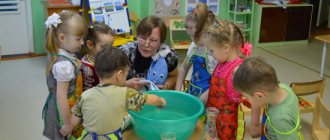Photo report “Cognitive and research activities of children of senior preschool age”
Alevtina Soboleva
Photo report “Cognitive and research activities of children of senior preschool age”
Relevance of the topic: a preschool is a natural explorer of the world around him. The world opens up to the child through the experience of his personal feelings, actions, and experiences. “The more a child has seen, heard and experienced, the more he knows and has learned, the more elements of reality he has in his experience, the more significant and productive, other things being equal, his creative and research activity ,” wrote Lev Semenovich Vygotsky .
The development of cognitive interests of preschool children is one of the pressing problems of pedagogy, designed to educate a person capable of self-development and self-improvement. Experimentation becomes one of the leading activities : “The fundamental fact is that the activity of experimentation permeates all areas of children’s life, all types of children’s activities , including play.” Play in exploration often develops into real creativity. And then, it doesn’t matter at all whether the child discovered something fundamentally new or did something that everyone has known for a long time. A scientist solving problems at the cutting edge of science and a child discovering a world still little known to him use the same mechanisms of creative thinking. Cognitive and research activities in a preschool institution allow not only to maintain existing interest, but also to excite, for some reason, extinguished, which is the key to successful learning in the future.
The development of cognitive activity in preschool children is especially important in the modern world, since thanks to the development of cognitive and research activities, children's curiosity and inquisitiveness of mind develop and, on their basis, stable cognitive interests .
of preschool education is being established in society . The role of a modern educator is not limited to conveying information to the child in a ready-made form. The teacher is called upon to lead the child to acquire knowledge, to help develop the child’s creative activity and imagination. It is in cognitive and research activities that a preschooler gets the opportunity to directly satisfy his inherent curiosity and organize his ideas about the world.
The purpose of the work on the topic of self-education: to create optimal conditions for the development of cognitive and research activities of older preschoolers as the basis for intellectual, personal, creative development; to combine the efforts of teachers and parents to develop the cognitive and research activities of older preschoolers .
Tasks:
-study methods, technologies for cognitive and research activities ;
- create conditions for maintaining children’s ;
- support children’s initiative , intelligence, inquisitiveness, independence, evaluative and critical attitude towards the world;
-develop children’s cognitive activity in the process of experimentation;
- develop observation, the ability to compare, analyze, generalize, develop children’s cognitive interest in the process of experimentation, establish a cause-and-effect relationship, and the ability to draw conclusions;
- develop attention, visual and auditory sensitivity
Experiments with a magnet.
Experiments with water.
Experiments with air.
Static electricity.
Observations.



